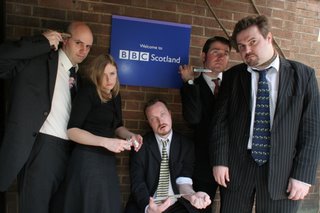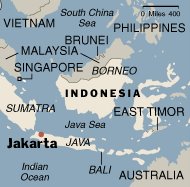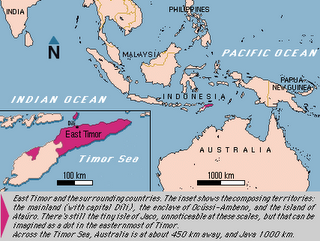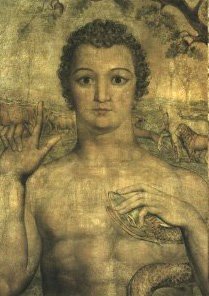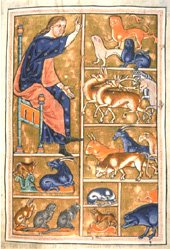You know you want it... I promised, and here it is: my first assignment for second semester. I don't know what mark I got as it's still in my tutor's hot little hands.
It contains references to Australian political figures, which non-locals will probably not understand. People living overseas who are not Australian may still find familiar resonances with their own political systems.
Previous posts are on how I got feedback from my friend the journalist, and before that I posted on an e-mail correspondence with my tutor about it. Earlier, I posted on how nervous I was about the workshopping. I also posted on the process of collecting the information for the story.
Suburban Heartland Suffers Electoral Psychosis
“It’s just, you’ve got to look at the bigger picture and get John Howard out,” says Lauren, standing under the shade of the pedestrian overpass at the back entrance of the Penrith Westfield shopping centre as the cars and choppers swish and growl over the speed bump at the pedestrian crossing and the Saturday shoppers scuttle across against the lights.
Lauren, a Penrith resident, is in the minority — at least at the federal level: the Liberal Party holds the federal seat of Lindsay, which encloses Penrith, an enclave on the edge of the suburban sprawl of Sydney, near the Nepean River and the M4 motorway. Driving north along Mulgoa Road from the M4 exit you pass the Penrith Panthers Rugby League Club, its asphalt apron suffocating under the press of thousands of cars that glint luridly in the noon sun.
“And, you know, my mum prefers the Liberal in our area, but I voted for the Labor Party because of the bigger picture,” continues Lauren. “Just to get John Howard out. I quite liked Mark Latham too. Most politicians say what they’re told to say. He’s calling people ‘ass-lickers’ and I like that. But it wasn’t so much that I like Latham’s policies, just I didn’t want John Howard in.”
Robert, another shopper, voted for the Liberals at both state and federal elections. But he’s not always impressed with what politicians get up to. “It’s been a bad week. If you take what they’ve been up to this week with the chickens and whatever, you wouldn’t vote for any of them.” Robert refers to the commotion caused when Labor members brought a toy chicken into the House of Representatives to lambast Peter Costello, the Treasurer, for cowardice in the face of John Howard’s refusal to give up the leadership of the Federal Parliamentary Liberal Party, and the prime ministership. “Who’s running the country when the Wilson Tuckeys and the Kim Beazleys are having a blue outside the Parliament?”
Penrith would seem to be a neighbourhood at war with itself. The federal seat of Lindsay is held by the Liberal Party with a majority of five per cent. The state seat of Penrith, which lies entirely within Lindsay’s borders, is held with a similar majority by the Labor Party.
When the Reserve Bank governor is set to retire, media commentators point to the power of political incumbency. When a state election date is announced, as it was recently, they do the same. But is it incumbency that is at issue? Is it, perhaps, something worse? Do voters just switch off?
“Absolutely. They all lie,” says Sandra, another Penrith resident. Did she remember how she voted last time? “No. I can’t change anything, so I just go with the flow.” David, however, thinks he voted for Jackie Kelly, the federal Liberal member for Lindsay, but he’s not sure. “I do like what she does. But I can’t remember who I voted for,” he says.
Are voters so desensitised to the manoeuvrings of politicians that they just don’t care any more? Or, is it that your average voter is simply tired of the faces of politicians zapping onto the television screen in the living room at 6:30 p.m. every evening when he’d really prefer to be watching a footy match or even a bunch of minor celebrities mucking about on ice skates?
Although most of the 22 shoppers interviewed for this story professed a tendency to vote one way or another, not one of them voted both for Labor at the state level and Liberal at the federal level. All state and territory governments in Australia now are Labor. The federal elections have been dominated by the Liberals for the past ten years. There seems to be no sign of this situation changing, at either state or federal level.
Chris and Emilio are staunch supporters of the current losers and the current winners (but for how long?). “Oh, I’m just a Labor voter from way back. Always been a Labor voter,” says Chris. Emilio tries to remember who he voted for. He thinks he always votes Labor but like many others spoken to on that sunny Saturday afternoon in downtown Penrith, he’s not sure.
The political settlement in Penrith could point to other factors, however. As Imre Salusinszky mused in March in an article about the outer suburbs of our cities, published in The Australian: “Does it mean that the electorate has decided it likes warm and cuddly social democrats to look after its services but right-wing death beasts to manage the economy and national security?”
The opinion outside Penrith Westfield is mixed, but no single individual manifested the behaviour that is causing incumbency to be such a strong point for governments. Some of the people interviewed were committed to an ideal, even if it was a negative one. “Well, Labor’s more for the ordinary people and the Liberal’s more for the upper class,” says Cheryl. “And I mean, the way the federal government gives hand-outs to private schools and forgets the public sector, you know…”
But other voters are simply tuning out, not getting any messages, turning away even before a message can be transmitted. Do they despise an Opposition that rejects everything the Government does, out of hand, simply because they are the Opposition?
“No matter who gets up there, they’re going to be doing the same thing,” says Nicolle. But she voted Liberal at the federal level. “Yes, I did. Because I didn’t like Mark Latham.” She laughs out loud because she thinks it’s funny that she cast her vote out of dislike for one of the candidates. “It’s lovely, isn’t it?”
“I don’t believe in the Government,” says Rebecca, who was the only person interviewed who voted for Pauline Hansen. “I think they’re all in it for the money. I hate voting. I think the politicians are all in it for themselves.”
The donkey vote for the House of Representatives in Australia rose from 3.2 per cent in 1990 to 5.2 per cent in 2004, when it was particularly high in New South Wales, at 6.1 per cent. But it was higher still in Penrith: 7.45 per cent. The statistics include voting results for the Senate, which uses much more difficult ballot papers but shows lower levels of informal voting, and so suggest that many of these donkey votes are deliberate. “Many of these voters will have turned up simply to avoid being fined,” according to an article on the Crikey.com Web site.
Nicolle voted for John Howard at the federal level but she doesn’t remember who she voted for at the state level. “I just went there just so I didn’t have to pay a fifty-dollar fine,” she says. “It’s the truth.” Does the political process turn her off? “No, just all the crap that goes along with it, all the things they say that never happen. So you just go there so you don’t pay the fine.”
Rowena is different. She thinks she voted for The Greens, but she’s surprised to find that she’s not quite sure at first who she voted for. “I did, I voted for The Greens,” she pipes up, relieved. She thinks they offer a louder voice for people who are marginalised.
Other Penrith residents also hold strong convictions and are more involved in the political process. Melissa always votes for Fred Nile at the federal level, but she says that she is a swing voter at the state level. “If they promise something good that I like, I’ll go for them.”
“I voted Liberal,” says Linda. “I look at the policies… I guess I’m what’s called a swing voter. I look at the policies and make my decision.” Does she get turned off by the political process? “No, I think we’ve got one of the best voting systems in the world.” She also volunteers to be an electoral scrutineer on occasion.
What does Antony Green — another electoral buff (perhaps our most significant), who is an election analyst with the ABC, the public broadcaster — think about the current political settlement in Australia? “Well, some of it is just an accident of timing. … [T]he Labor Party seem to do perfectly well at the state level. They just haven’t won any federal elections. So the Labor Party can’t be that weak at the moment.
“The federal Liberal government was elected at a good time,” he says. “It’s profited from a decade of glorious economic sunshine in the same way that the Blair government in Britain has. Both have come to office when the previous governments were discredited with high interest rates in the early nineties.”
Adam, another Penrith shopper, agrees with Green. “I disagree with the Liberal government riding on the back of interest rates. They take too much credit.” He voted for The Greens.
Continues Green: “But the gap between federal and state voting intentions has been seen before. It’s not something which is particularly new to this decade. If you go back to the nineteen-seventies, the electorate was happily electing the Fraser government in the outer suburbs of Sydney at the same time they were voting for Neville Wran and the Labor Party at the state level. So there’s nothing new.
“I think there is always a terrible tendency for people to try and draw conclusions on philosophies of views of the electorate,” he says, “when often what’s occurred is just an accident of history.”
It contains references to Australian political figures, which non-locals will probably not understand. People living overseas who are not Australian may still find familiar resonances with their own political systems.
Previous posts are on how I got feedback from my friend the journalist, and before that I posted on an e-mail correspondence with my tutor about it. Earlier, I posted on how nervous I was about the workshopping. I also posted on the process of collecting the information for the story.
Suburban Heartland Suffers Electoral Psychosis
“It’s just, you’ve got to look at the bigger picture and get John Howard out,” says Lauren, standing under the shade of the pedestrian overpass at the back entrance of the Penrith Westfield shopping centre as the cars and choppers swish and growl over the speed bump at the pedestrian crossing and the Saturday shoppers scuttle across against the lights.
Lauren, a Penrith resident, is in the minority — at least at the federal level: the Liberal Party holds the federal seat of Lindsay, which encloses Penrith, an enclave on the edge of the suburban sprawl of Sydney, near the Nepean River and the M4 motorway. Driving north along Mulgoa Road from the M4 exit you pass the Penrith Panthers Rugby League Club, its asphalt apron suffocating under the press of thousands of cars that glint luridly in the noon sun.
“And, you know, my mum prefers the Liberal in our area, but I voted for the Labor Party because of the bigger picture,” continues Lauren. “Just to get John Howard out. I quite liked Mark Latham too. Most politicians say what they’re told to say. He’s calling people ‘ass-lickers’ and I like that. But it wasn’t so much that I like Latham’s policies, just I didn’t want John Howard in.”
Robert, another shopper, voted for the Liberals at both state and federal elections. But he’s not always impressed with what politicians get up to. “It’s been a bad week. If you take what they’ve been up to this week with the chickens and whatever, you wouldn’t vote for any of them.” Robert refers to the commotion caused when Labor members brought a toy chicken into the House of Representatives to lambast Peter Costello, the Treasurer, for cowardice in the face of John Howard’s refusal to give up the leadership of the Federal Parliamentary Liberal Party, and the prime ministership. “Who’s running the country when the Wilson Tuckeys and the Kim Beazleys are having a blue outside the Parliament?”
Penrith would seem to be a neighbourhood at war with itself. The federal seat of Lindsay is held by the Liberal Party with a majority of five per cent. The state seat of Penrith, which lies entirely within Lindsay’s borders, is held with a similar majority by the Labor Party.
When the Reserve Bank governor is set to retire, media commentators point to the power of political incumbency. When a state election date is announced, as it was recently, they do the same. But is it incumbency that is at issue? Is it, perhaps, something worse? Do voters just switch off?
“Absolutely. They all lie,” says Sandra, another Penrith resident. Did she remember how she voted last time? “No. I can’t change anything, so I just go with the flow.” David, however, thinks he voted for Jackie Kelly, the federal Liberal member for Lindsay, but he’s not sure. “I do like what she does. But I can’t remember who I voted for,” he says.
Are voters so desensitised to the manoeuvrings of politicians that they just don’t care any more? Or, is it that your average voter is simply tired of the faces of politicians zapping onto the television screen in the living room at 6:30 p.m. every evening when he’d really prefer to be watching a footy match or even a bunch of minor celebrities mucking about on ice skates?
Although most of the 22 shoppers interviewed for this story professed a tendency to vote one way or another, not one of them voted both for Labor at the state level and Liberal at the federal level. All state and territory governments in Australia now are Labor. The federal elections have been dominated by the Liberals for the past ten years. There seems to be no sign of this situation changing, at either state or federal level.
Chris and Emilio are staunch supporters of the current losers and the current winners (but for how long?). “Oh, I’m just a Labor voter from way back. Always been a Labor voter,” says Chris. Emilio tries to remember who he voted for. He thinks he always votes Labor but like many others spoken to on that sunny Saturday afternoon in downtown Penrith, he’s not sure.
The political settlement in Penrith could point to other factors, however. As Imre Salusinszky mused in March in an article about the outer suburbs of our cities, published in The Australian: “Does it mean that the electorate has decided it likes warm and cuddly social democrats to look after its services but right-wing death beasts to manage the economy and national security?”
The opinion outside Penrith Westfield is mixed, but no single individual manifested the behaviour that is causing incumbency to be such a strong point for governments. Some of the people interviewed were committed to an ideal, even if it was a negative one. “Well, Labor’s more for the ordinary people and the Liberal’s more for the upper class,” says Cheryl. “And I mean, the way the federal government gives hand-outs to private schools and forgets the public sector, you know…”
But other voters are simply tuning out, not getting any messages, turning away even before a message can be transmitted. Do they despise an Opposition that rejects everything the Government does, out of hand, simply because they are the Opposition?
“No matter who gets up there, they’re going to be doing the same thing,” says Nicolle. But she voted Liberal at the federal level. “Yes, I did. Because I didn’t like Mark Latham.” She laughs out loud because she thinks it’s funny that she cast her vote out of dislike for one of the candidates. “It’s lovely, isn’t it?”
“I don’t believe in the Government,” says Rebecca, who was the only person interviewed who voted for Pauline Hansen. “I think they’re all in it for the money. I hate voting. I think the politicians are all in it for themselves.”
The donkey vote for the House of Representatives in Australia rose from 3.2 per cent in 1990 to 5.2 per cent in 2004, when it was particularly high in New South Wales, at 6.1 per cent. But it was higher still in Penrith: 7.45 per cent. The statistics include voting results for the Senate, which uses much more difficult ballot papers but shows lower levels of informal voting, and so suggest that many of these donkey votes are deliberate. “Many of these voters will have turned up simply to avoid being fined,” according to an article on the Crikey.com Web site.
Nicolle voted for John Howard at the federal level but she doesn’t remember who she voted for at the state level. “I just went there just so I didn’t have to pay a fifty-dollar fine,” she says. “It’s the truth.” Does the political process turn her off? “No, just all the crap that goes along with it, all the things they say that never happen. So you just go there so you don’t pay the fine.”
Rowena is different. She thinks she voted for The Greens, but she’s surprised to find that she’s not quite sure at first who she voted for. “I did, I voted for The Greens,” she pipes up, relieved. She thinks they offer a louder voice for people who are marginalised.
Other Penrith residents also hold strong convictions and are more involved in the political process. Melissa always votes for Fred Nile at the federal level, but she says that she is a swing voter at the state level. “If they promise something good that I like, I’ll go for them.”
“I voted Liberal,” says Linda. “I look at the policies… I guess I’m what’s called a swing voter. I look at the policies and make my decision.” Does she get turned off by the political process? “No, I think we’ve got one of the best voting systems in the world.” She also volunteers to be an electoral scrutineer on occasion.
What does Antony Green — another electoral buff (perhaps our most significant), who is an election analyst with the ABC, the public broadcaster — think about the current political settlement in Australia? “Well, some of it is just an accident of timing. … [T]he Labor Party seem to do perfectly well at the state level. They just haven’t won any federal elections. So the Labor Party can’t be that weak at the moment.
“The federal Liberal government was elected at a good time,” he says. “It’s profited from a decade of glorious economic sunshine in the same way that the Blair government in Britain has. Both have come to office when the previous governments were discredited with high interest rates in the early nineties.”
Adam, another Penrith shopper, agrees with Green. “I disagree with the Liberal government riding on the back of interest rates. They take too much credit.” He voted for The Greens.
Continues Green: “But the gap between federal and state voting intentions has been seen before. It’s not something which is particularly new to this decade. If you go back to the nineteen-seventies, the electorate was happily electing the Fraser government in the outer suburbs of Sydney at the same time they were voting for Neville Wran and the Labor Party at the state level. So there’s nothing new.
“I think there is always a terrible tendency for people to try and draw conclusions on philosophies of views of the electorate,” he says, “when often what’s occurred is just an accident of history.”
